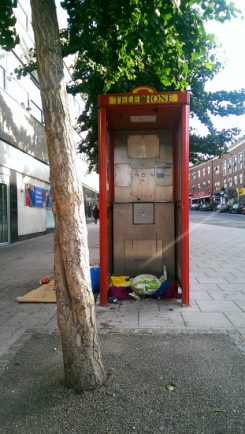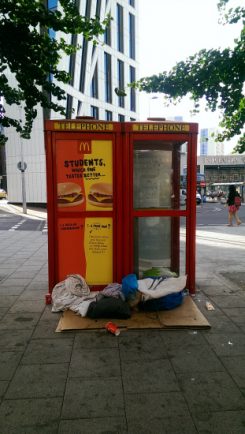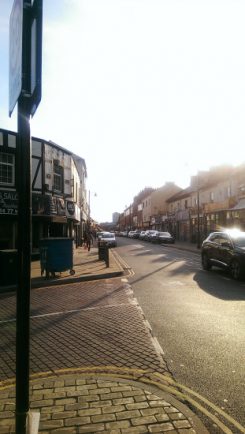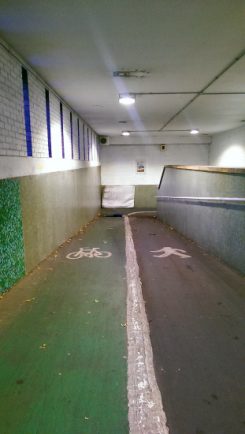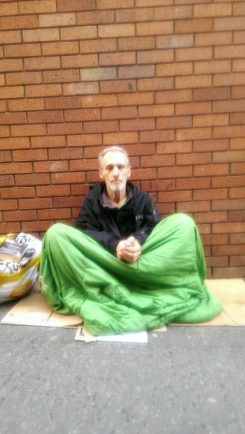SPECIAL REPORT BY LOLA JOHNSON:
THE government is funding a project to eliminate rough sleeping in Coventry within 10 years. But will it work?
Reporter LOLA JOHNSON interviewed people sleeping on the street themselves, with candid results.
KATE’S STORY
‘You’ve just got to smile.
“I know some nights I just lie here, and I feel so down and depressed and I start crying.
“But you’ve just got to get on with it. It is what it is. I know there is a light at the end of that tunnel.”
Rough sleeper Kate Money spoke eloquently to us about the psychological, circumstantial and systemic aspects of live on the streets in Coventry.
And with years of experience of fellow rough sleepers, she is sceptical that the government and local authorities will succeed in ending it.
“A lot of them out on the streets, most of them are in the Salvation Army, but they come out here to beg for money to get drugs, alcohol and things like that.
“That’s how they can claim benefits, because they have a room at the Salvation Army.
“I haven’t claimed benefits in three years. I can’t, because I don’t have an address.
“The system is horrible. It is not set up to help you move away from needing shelters in the first place. I’ve been attacked on the street in the past.
In the Salvation Army, you can’t get a room straightaway. You have to say you are a rough sleeper, and they put you in a room full of men. And if you’re a woman who’s been through domestic violence and rape, you don’t want to be in a room full of men that you don’t know.
“Some of the locals here are alright,’ the 33-year-old added. You get some nice people out here, but you get some nasty ones. A lot of people judge straightaway.
They don’t ask why you’re in this situation or anything.
‘I’ve started to get depression now. I also have borderline bipolar and post-traumatic stress disorder. I’ve been to Mind. They have been helpful. They keep wanting me to see psychiatrists, while pumping me with different tablets. I don’t want to keep taking those different tablets: I just want to be me.
“The problem is a lot of tablets they give you are like sleeping pills. I can’t sit here with my head touching the floor.”
Kake says she has been in Coventry since whe was 16, and has used homeless shelters since then.
“I went to school in Rugby. I moved to Coventry, because my mum kicked me out. Rugby hasn’t got any homeless shelters or anything, so I got sent here. It’s been hard,” she says.
In May this year, the government’s communities secretary James Brokenshire awarded funding to the West Midlands to reduce rough sleeping.
The Ministry of Housing, Communities and Local Government launched three pilot projects based on Housing First, an ‘internationally proven’ approach to supporting rough sleepers into long-term accommodation.
The three pilot projects were launched in Liverpool City, Greater Manchester and West Midlands, the latter receiving £9.6 million.
The government aims to halve homelessness by 2022 and eliminate it completely by 2027.
West Midlands mayor Andy Street set up the West Midlands Homelessness Task Force to ‘design out homelessness in the West Midlands’.
Local rough sleeper Kate Money said: ‘I’ve been in Coventry since I was 16. And I’ve been in homeless shelters since then.
‘I went to school in Rugby. I moved to Coventry, because my mum kicked me out. Rugby hasn’t got any homeless shelters or anything, so I got sent here. It’s been hard.”
Asked about the government’s bid to eliminate homelessness, Kate said: “It’s not going to work.
“A lot of them come out here to make money for drugs and alcohol. You are still going to get people kicked out of these hostels, so they’re going to still be homeless.
“It’s things that people do, like either get kicked out for criminal damage, abusive behaviour, alcohol, drugs or even suffer racist abuse (there is a lot of racism going around at the moment).
“Landlords have had a lot of problems with black people coming over, renting their properties, paying the first month, and then after that they don’t pay a penny. And it takes like a year or two for the landlord to get them out of there.
“But a lot of white English people do that too, so we need to move out of labelling things and labelling people. Everybody is doing it.”
Official estimated national rough sleepers’ numbers have nearly trebled in the last decade,
In 2012 the cost of homelessness in England was reported as being up to £1 billion a year.
According to UK law, governmental and private bodies must confirm an individual’s immigration status before providing a wide range of services, including jobs, private tenancies, bank accounts and non-emergency healthcare.
Homeless migrants are particularly likely to struggle to fulfil these requirements, placing them at risk of falling out of the mainstream of society and into homelessness.
GARRY’S STORY
Garry Connop, another of Coventry’s homeless population, used to work as a builder.
“I’ve been a builder ever since I was 16. I’ve got deep vein thrombosis in my leg.
I lost my job. I was off work for a few months. I lost my flat.
“The savings I had for my flat, I spent on rent and food. Once that ran out, I asked the landlord if he could give me a squeeze until I get back into work. He said ‘no’. I had to leave. So, I left the house and here I am – that is my situation.
“I asked for income support. I was 10 minutes late for my appointment, because I couldn’t walk properly. I got sanctioned, which means you don’t get any money, then they go back, and they review your application a few weeks later.
‘‘I sit here, and I don’t ask people for money. If they pity me, good. If they don’t, then I go hungry, you know? That’s the situation.
‘‘People look down on you, as if you’re just something on the bottom of their shoe.
They don’t know what situation has put you in the predicament that you’re in at the moment.
‘The other day a guy came down here and asked me if I could get him drugs. And I looked at him and thought, ‘You cheeky so-and-so.’ You know, they stereotype me.
“Because I’ve got a sleeping bag around me, he obviously thought I’m a drug addict. I would do any urine sample, whatever, to prove that I’m not a drug addict. The only drug I use is tobacco. So, I told the guy, basically, to go away.”
Gary, originally from Scotland, worked on the building site on Friars Road only last year.
“I get building work coming through all the time. But I can’t do it, because I’m homeless. It would be hard to get up in the morning.
“If I don’t get any money for food from people the night before, then I can’t eat. You know, you can’t go to work with no food inside your belly. It’s a Catch-22.
‘As soon as I get enough to get food, then get to work, I’ll be back on my feet again.”
For Gary, there’s no protection put in place by the government to prevent people from becoming homeless.
’It is very easy to become homeless. I’ve been down to the council. I’m on the waiting list for housing. I’ve been to the Salvation Army. Again, there’s a waiting list.
There are just too many people to help.
“The government needs to put more money into helping rough sleepers out of their predicament and preventing people from becoming homeless in the first place.
It’s common sense.
“I’ve paid taxed all my life. Why is it that foreigners come over, they get money to start their own business; they get the keys for the house. I’ve paid taxes all my life, why don’t I get the same?
“I feel lonely and I feel depressed.”
(A week later after the interview, Gary found work. He said: ‘I knew I would get back into work, and I have!’
‘I am exceedingly happy! It is nice to have some money in my pocket. I am going to get some food now. I am still homeless, but once I save up enough money from work, I will be able to rent a home again.’)
MELISSA’S STORY:
30-year-old Melissa, from Bedworth, said: ‘I moved down to Coventry a few years ago to move in with a friend.
“I lost my job at the Hinckley warehouse, and I couldn’t pay my rent. I worked there for about seven years.
“I’ve been a rough sleeper for about a year now. There are some good people out there, but a lot of people don’t acknowledge you as a person. They pretend they don’t see you and they ignore you.
“But then you get the good people that do buy you food and stop and help you with money for rooms and stuff.
“I did go to the council for help, but I didn’t find them useful, because they refer you to the Salvation Army. I’d rather stay on the streets. I stayed at the Salvation Army one night and all my stuff got nicked.
“Being out here is uncomfortable. It can get you down, but you’ve just got to keep soldiering on.
“I bid every Wednesday. I keep bidding for property. That’s all I can do. You bid on a computer at the library for single properties. I imagine the council pay it. But there’s so many limited one-bedroom properties for single people.
“The system is not necessarily very helpful. It’s so easy to become a rough sleeper.
“All you have to do is lose your job and miss one or two payments.”
For Kate, who sleeps near Pool Meadow, on Trinity Street, rough sleepers in Coventry have formed their own community.
“When you first get on the street, you start getting to know the homeless people.
“Then you start talking to them. There aren’t many girls. All the lads, when they go past me, ask me if I’m alright.
“They make sure no one’s troubling me. We do look out for each other.”

